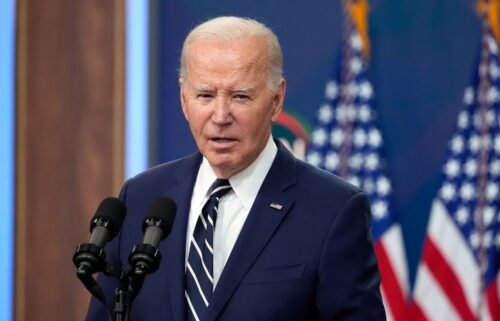How former Kentucky Gov. Bevin’s pardons are affecting those convicted and the victims’ families

Former Kentucky Gov. Matt Bevin was on his way out of office when he dropped a huge batch of pardons and commutations of sentences of hundreds of Kentuckians.
Bevin’s final actions in office didn’t become public until the Louisville Courier Journal reported on the high volume of pardons.
Governors and presidents pardon people throughout their tenures and often pardon many people as they leave office, too, but there was shock throughout the state over the sheer number of pardons filed, confusion within the secretary of state’s office over exactly how many were signed and filed and outrage over some pardons for violent criminals.
According to the Kentucky secretary of state’s website, as many as 161 pardons and 419 commutations of sentences were filed on December 11, including commutations for 336 people who were serving sentences solely for drug related charges.
Bevin, whose last day in office was December 9, said on Twitter that he “personally spent hundreds of hours reading every application and file” of those pardoned and “personally wrote every word of justification for each pardoned granted and each sentence commuted.”
Uproar over the controversial pardons
There were accusations from critics that some of the pardons had been political in nature, which Bevin denied.
Bevin pardoned and commuted the sentence of Patrick Baker, who convicted of reckless homicide in 2017.
The Courier Journal reported that Baker’s family had held a fundraiser and donated to Bevin’s gubernatorial campaigns. Baker served two years of a 19-year sentence, while his co-defendants are still in prison, the newspaper reported.
In a joint statement provided to CNN on Monday, the Commonwealth’s Attorneys’ Association and the County Attorneys’ Association said Bevin’s “arbitrary, callous, and, in at least one case, seemingly corrupt, decision to pardon many violent felons on his way out of office was an abuse of his power.”
Bevin responded on Twitter Friday, calling the allegations that he took politics into account “false.”
“The myriad statements and suggestions that financial or political considerations played a part in the decision making process, are both highly offensive and entirely false…To repeat such uncorroborated rumors and lies is reprehensible,” he said.
Attorney Elliot Slosar, of Loevy & Loevy, who represents Baker, said in a news conference Tuesday that Baker’s pardon was “because DNA evidence clears him from the murder.” He also said he believes there is an alternative suspect out there.
Baker said that his pardon “was a big surprise, like an early Christmas present.”
Criticism over pardons for violent offenses
Others raised concerns over the pardons and commutations for people convicted for violent offenses — including cases of murder and rape.
Senate Majority Leader Mitch McConnell called Bevin’s pardons “completely inappropriate,” according to CNN affiliate WKYT.
“I expect (Bevin) had the power to do it, but looking at the examples of people who were incarcerated as a result of heinous crimes — no, I don’t approve of it,” the Kentucky Republican said, WKYT reported.
One such pardon that made headlines was for Delmar Partin, who was found guilty in 1994 in the death of Betty Carnes. In September 1993, Carnes disappeared from her job site at a manufacturing plant and her decapitated body was found in a barrel in the plant lab a day later, according to court documents.
Bevin wrote in his executive order that he’s pardoning Partin “given the inability or unwillingness of the state to use existing DNA evidence to either affirm or disprove this conviction.”
He commuted Partin’s sentence from life to time served.
Bill Johnson, who was the lead defense attorney at Partin’s 1994 trial, told CNN he was “delighted” to hear that Partin was pardoned because he had “always felt that there was certainly more than a reasonable doubt as to whether” Partin committed the offense. Johnson said he kept in contact with Partin over the years — though he has not spoken to him since the pardon — and said Partin didn’t cause any trouble in prison. He also said a weapon was not found at the time of the trial and there was no evidence of blood on Partin’s clothes despite the gruesome nature of the Carnes’ death.
The former governor also pardoned and commuted the sentence of Micah Schoettle, convicted last year of raping a child and sentenced to 23 years in prison.
Prosecutor Rob Sanders of Kenton County told CNN on Friday that Schoettle, who is under his jurisdiction, was not in custody long enough to start sex offender treatment and argued that Schoettle’s release puts other children in the area at risk.
CNN has reached out to Schoettle’s attorney for comment.
Bevin on Twitter wrote “not one person receiving a pardon would I not welcome as a co-worker, neighbor, or to sit beside me or any member of my family in a church pew or at a public event.”
CNN has reached out to Bevin and has not heard back.
‘Many deserving people’ pardoned
Kentucky Public Advocate Damon Preston, who was appointed by Bevin, argued that “many deserving people were helped by Governor Bevin’s pardons.”
“Aside from the uproar over a handful of cases, scores of Kentuckians are now quietly benefiting from non-controversial pardons of long-ago convictions,” Preston wrote in an op-ed published in the Lexington Herald Leader Saturday.
In one executive order signed December 9, Bevin commuted the sentences for 336 inmates who are “solely serving” sentences for drug possession. A number of the pardons that Bevin issued are also for drug-related convictions.
The incarceration rate in Kentucky is higher than the national incarceration rate, according to the Prison Policy Initiative, a nonprofit think tank. Kentucky also held the second highest imprisonment rate for women in 2017, according to an April report from the Bureau of Justice Statistics.
Suzanne Hopf, the director of the Kentucky Innocence Project, told CNN on Monday that her organization had submitted to Bevin’s office summaries of the cases they thought were the most deserving of a pardon or commutation about 10 days prior to the inauguration of the new governor.
The organization investigates and litigates cases of those serving prison sentences for crimes they may not have committed.
According to Hopf, Bevin had called some of the organization’s clients to notify them that he would be granting them a pardon.
“I do think (Bevin’s consideration) was perhaps with more reason and care than people assume,” Hopf told CNN, noting that the volume of pardons and commutations is unusual.
She stressed that her clients who were pardoned had shown “several decades of good behavior” either in institutions or on home release on parole.
The organization’s clients who were pardoned by Bevin were “beyond excited” when they received the news, Hopf said.
Johnetta Carr, who spent roughly six years in jail for a crime she says she did not commit, told CNN that being pardoned by Bevin was “the best moment of my life thus far.”
Bevin called Carr to personally deliver the news that she would be among the many to receive a pardon, Carr said.
“That phone call changed my life,” Carr recalled to CNN, getting emotional.
Bevin’s executive order showed that Carr was convicted in 2008 of manslaughter, conspiracy to commit robbery, conspiracy to commit burglary and tampering with physical evidence. Carr said she was a teenager at the time when she was interrogated by police and coerced into a false confession, leading to her be convicted for the crime.
Hopf said there were a number of factors that made the Innocence Project believe that Carr had been wrongly convicted, including that several items that were recovered were not DNA tested.
“The nightmare’s kind of over,” Carr told CNN, adding that while she can never get back those years she spent incarcerated, she can now move on.
Carr now plans on returning to school and pursuing a bachelor’s degree in criminal justice.
Victims’ families were not notified
The news came as a shock to some of the families of the victims, who say they did not receive a heads up from the governor’s office.
Erin Wright told CNN that receiving the news of Bevin’s pardon of the man who killed her sister, Amber Rachford, in a drunk driving accident had “ripped the wound back open.”
Gary Cooper III was convicted in 2008 for the death of Rachford, 27. Cooper and Rachford had been driving home from a baseball game in April 2007, when Cooper’s car careened off the highway and struck a tree, according to local news reports at the time. Rachford died at the scene, news reports said. Later, accident investigation reports showed Cooper’s blood alcohol level was well above the legal limit, local media reported.
“But still now it’s as if it didn’t happen. That my sister’s life didn’t matter. That it was so insignificant that his life can continue, as if nothing happened, as if he didn’t take these actions that harmed our family so much,” Wright told CNN in a phone interview Monday. Wright had found out about Cooper’s pardon when CNN reached out to her.
Cooper “had turned his life around and has paid his debt to society,” Bevin wrote in his pardon.
Wright disagreed with Bevin and said Cooper never apologized to her family.
“To turn him back loose and put him back on the road, it scares me to think that’s he’s out on the roads driving again,” Wright said, adding, “I don’t know if his behavior has changed.”
Wright said the loss of her sister destroyed their family.
“(Amber) was just a really giving person. No one met her who didn’t like her. She was just a happy, lighthearted person, fun person to be around,” Wright said.
CNN has tried to reach Cooper for comment.
One family’s story of forgiveness
A man pardoned by Bevin for the murder of his parents when he was a teenager, is being embraced by most members of the family, according to a cousin who spoke to CNN.
Barbara Peterson was killed along with her husband in 2002 by their then-16-year-old son. Their son, Blake Walker, then spent 17 years in prison before being pardoned by Bevin, according to Jim Peterson, Barbara’s cousin.
Speaking through tears on the phone, Peterson told CNN he has “no doubt that Barbara, his mother, would be the happiest person involved, bar none. There’s no way that she would not want her son to be home with family and to be in a safe place.”
Peterson said his cousin and her husband were a joy to be around and had done a lot of work with nongovernmental organizations in third-world countries.
“(Barbara) was just the most delightful person in the world with a smile that lit up the room,” Peterson said. “What they did in the third world is unbelievable.”
Peterson said he can understand the grief of victims who are finding out their perpetrators have been set free, because for several years, “I wanted the worst to ever happen to that kid [Blake Walker], because he took away two people that were amazing.”
But then Peterson said he received a letter from a professor who had taught Walker in prison, describing Walker as the best student he’d had in 34 years. The letter went on to describe Walker as a born leader.
Peterson said, “I thought, ‘How could I feel so bitter and want revenge?… I’ve got something really wrong here. I need to talk to the family, and I need to understand this better.'”
Since then, he visited Walker in prison and became convinced that Walker showed a lot of promise for becoming a productive member of society. Peterson now advocates for rehabilitation and speaking against mass incarceration.
A pardon with unusual conditions
Michael Andrew Hardy, who killed Jeremy Pryor in a 2014 drunken driving accident, was pardoned by Bevin, on the condition that Hardy stay sober and speak about his crime and his victim six times per year.
While the governor’s order specifically requires Hardy to share the name of Jeremy Pryor when he speaks to schools and churches, the Pryors do not want Hardy to ever mention their son’s name.
“It’s so inexplicable,” said Alan Simpson, a representative of the Pryor family.
Regarding the required speaking engagements, Simpson added that “anytime that we can prevent a tragedy we should. An ounce of prevention, you know the old saying. It’s a good thing in general, but in this particular case it’s just done in poor taste by the governor.”
Hardy served fewer than four years of his 20-year sentence. Simpson called it “a slap in the face.”
Mary Leonard, a friend and representative of Hardy, said Hardy truly wants to turn things around and make a positive impact on the world. She added that he is extremely committed to maintaining his sobriety and is “amazingly remorseful.”
“(Hardy) would absolutely trade his life for Jeremy’s, if it was an option to him,” Leonard told CNN.
Leonard also said that Hardy had no previous criminal record before this incident.




